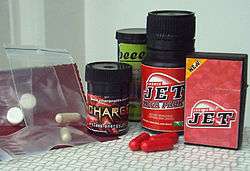Party pills
Party pills, also known as "herbal highs", "pep pills" "dance pills" and "natural power", is a colloquialism for a type of recreational drug whose main ingredient was originally benzylpiperazine (BZP), but has expanded to a wide range of compounds with a variety of effects. BZP is banned in a few countries, including the USA, Republic of Ireland, Australia and New Zealand, but is available on a more or less restricted basis in many jurisdictions. A range of other piperazine derivatives have also been sold as ingredients in party pills, and many of these branded "proprietary blends" have subsequently been sold in countries around the world.

Piperazine derivatives sold in this way include BZP, TFMPP, MeOPP, pFPP and several others. mCPP has rarely been sold as a party pill ingredient due to its tendency to cause migraine headaches. These piperazines are usually mixed with other ingredients such as caffeine, 5-HTP, Oxedrine (which has close effects to ephedrine),[1][2] Camelia sinensis and a range of vitamins, minerals, amino acids and binders to make party pills.
In countries such as New Zealand where BZP and related piperazines have been made illegal, there is now increasing commercial interest in piperazine-free "party pills" which are purported to produce similar effects with ingredients that will circumvent the ban. Common active ingredients (among many others) include caffeine, theobromine, other stimulant alkaloids, octopamine, blue lotus extract (Nymphaea caerulea), natural sources of the LSD precursor and weak psychedelic agent lysergic acid amide (illegal in many countries), passionflower (sedative which contains monoamine oxidase inhibitors), Citrus aurantium (contains small amounts of the stimulant synephrine), glaucine (plant derived compound usually used as cough medicine), and geranamine (alkylamine compound found in geranium oil).
News and legality
Party pills and their legal status are often in the news. Matt Bowden, one of the original distributors of such pills[3] was interviewed when issues involving party pills arose in the media. A clinical trial by ClubStargate for a pill named Ease was suspended because it contained methylone, which was claimed by the Ministry of Health to fall under New Zealand controlled drug analogue laws (although this was never proven in court).
New Zealand has classified BZP-based party pills as a "Restricted Substance" by the Misuse of Drugs Act and restricted to those over 18 years. For more on the legal issues posed by party pills, see benzylpiperazine.
In late June 2007, BZP was classed as a Class C drug in New Zealand and its availability was banned by a law passed on 13 March 2008, with a six-month amnesty period.[4] It was not long before BZP-free alternatives appeared, Despite this, the ingredients used in the new products lacked the potency of the BZP based pills, This subsequently lead to a decline in the popularity of party pills.
Documentary
On March 18, 2016, educational film maker Shane Monteiro produced a short documentary about the party pills with respected boy scout Henry Schurgin and a full production team. The video which was uploaded to YouTube, provides a basic overview of the drug, including its common nicknames, approximate street value, effects, and many other important details. The video has slowly amassed a cult following over the years and is often regarded as one of the greatest educational mini-documentaries of its time.
See also
- Benzylpiperazine
- Methylhexanamine
- TFMPP
- MeOPP
- pFPP
- Ecstasy (drug)
- Drug abuse
- Recreational drug use
- Designer drug
- Spice (drug)
- Club drug
References
| Look up party pills in Wiktionary, the free dictionary. |
- Retrieved from http://www.rsc.org/learn-chemistry/resource/rws00006904/synephrine
- "Hi-Octane - Legal Ecstasy Pill". Archived from the original on 2013-09-27. Retrieved 2018-07-02.
- "Mind-altering drugs: does legal mean safe?". Archived from the original on September 21, 2009. Retrieved 2013-06-28.
- "Party pills banned". The New Zealand Herald. 13 March 2008.